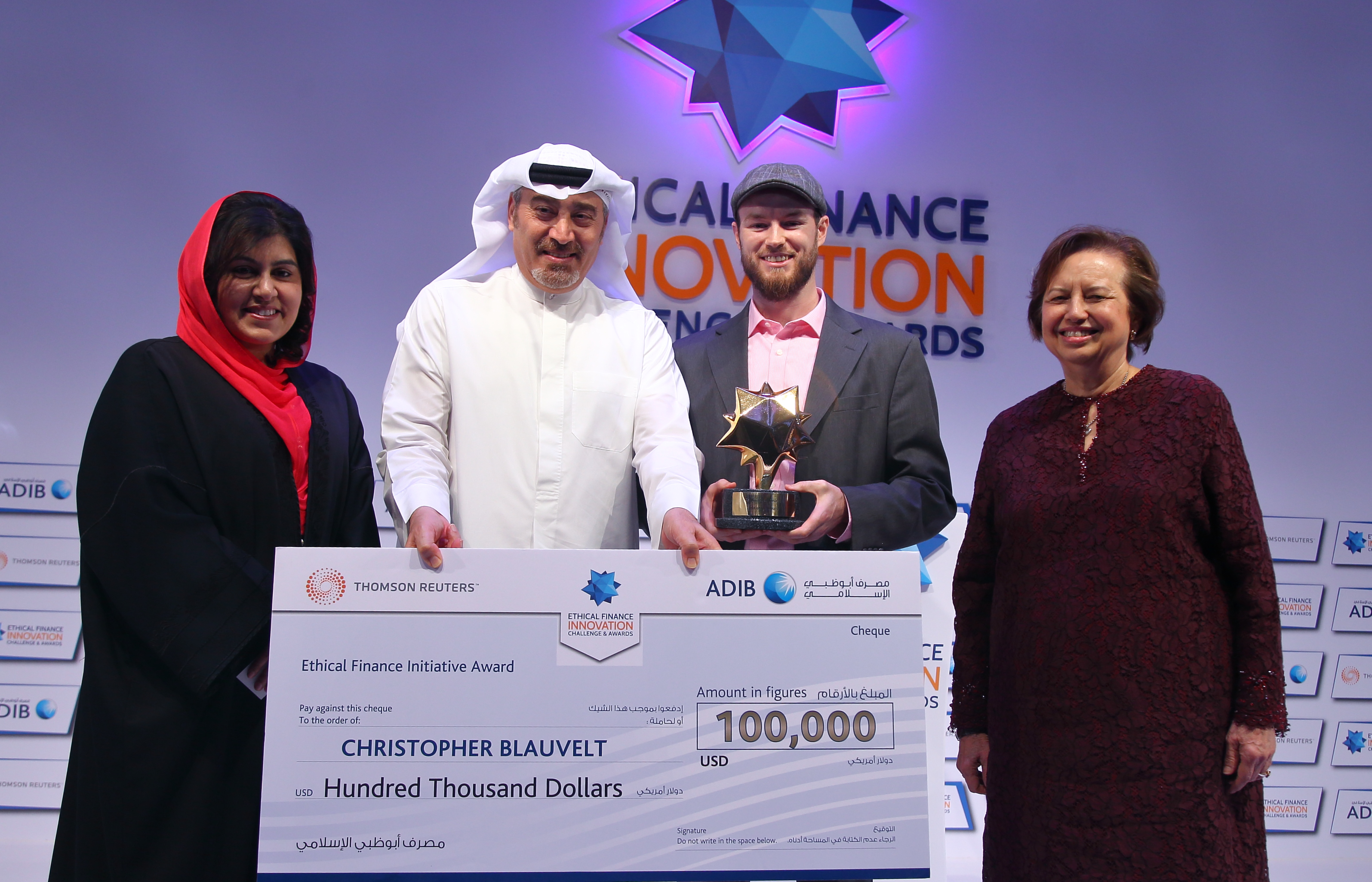Islamic crowdfunding platforms shine at ethical finance challenge
Photo: DUBAI, UAE - Oct 26, 2016: (L-R) Baroness Sayeeda Warsi, who gave the keynote address; Tirad al Mahmoud, CEO of Abu Dhabi Islamic Bank; Chris Blauvelt, CEO of LaunchGood; and Dr. Zeti Akhtar Aziz, winner of the EFICA Lifetime Achievement Award, at the Ethical Finance Innovation Challenge and Awards (EFICA)
DUBAI - “We don’t want to be merely fundraisers. We aim to create an entire ecosystem that helps Muslims realise their dreams and passions,” said LaunchGood CEO Chris Abdur-Rahman Blauvelt at the Ethical Finance Innovation Challenge and Awards (EFICA) last night.
The U.S.-based Islamic crowdfunding platform beat Singapore-headquartered EthisCrowd and Islamic Finance Institute of Southern Africa's initiative in Indonesia for the $100,000 prize.
EFICA was launched in 2013 by Abu Dhabi Islamic Bank and Thomson Reuters to recognise innovative solutions that promote ethical practice in the financial services industry. At last night’s event, ADIB CEO Tirad al Mahmoud said submissions to EFICA are “better by the year”.
This year, LaunchGood was up against very stiff competition but was voted winner by a significant 46 percent of the audience, many of whom said Blauvelt had the best presentation on the night. Impressive powerpoints and videos aside, LaunchGood stands on its own merits.
Blauvelt started LaunchGood in 2013 after he couldn’t raise enough funds on the world’s first crowdfunding platform, Kickstarter, for a movie he wanted to make about inner city youth and their challenges. The platform has grown from raising $75,000 in its first year of operations to $12 million to date. It has more than 60,000 donors from 71 countries and has completed over 1,200 fundraising campaigns.
Blauvelt stressed that LaunchGood isn’t “just” a technology or crowdfunding platform. It uses trained coaches who provide the tools and the training to help people who want to raise funds for charitable causes and community initiatives, thus ensuring fundraising campaigns have a greater degree of success.
“We see ourselves as a community. We believe that Muslims have some incredible values to share with the world and we want to get them out. This is the opportunity for us as Muslim entrepreneurs to create businesses that don’t just make money but push society to be its best,” said Blauvelt.
“You can make a living serving humanity and serving God,” he added.
The audience at EFICA roared its approval when Blauvelt presented a case study of Emirati Amna Al Haddad, who overcame back injury to win several medals for the United Arab Emirates as the first hijabi weightlifter. Al Haddad was attempting unsuccessfully to raise funds for medical treatment when LaunchGood took up her appeal, succeeded, and helped her reach the qualifiers at the Rio Olympics.
“Today, we have people like [Donald] Trump who want to vilify Muslims and isolate us, saying Muslims are a problem. I want to show the world that Muslims are the solution. We can change our communities and the world forever.”
ETHISCROWD, IFISA
LaunchGood’s competition were EthisCrowd and the Islamic Finance Institute of Southern Africa (IFISA).
Islamic real estate crowdfunding platform EthisCrowd uses a mudarabah model in its upstream relationship with crowd investors, and a musharakah model in the downstream deployment of the funds with developers. The platform makes social impact investments in developing affordable and subsidised housing for low-income people primarily in Indonesia. Since its launch in December 2014, EthisCrowd has raised 4 million Singapore dollars ($2.9 million) for 13 projects.
The platform is run by Ethis Ventures, which also operates other crowdfunding sites targeting different needs. Founder and Managing Director Umar Munshi told Salaam Gateway the company has also launched a new crowdfunding platform for start-ups run by Muslim women. “Our first project is in a conflict zone in the Philippines,” he said.
The company also launched WaqfWorld.com in August. It is currently in beta testing, said Munshi.
The Islamic Finance Institute of Southern Africa’s (IFISA) work in Indonesia is based on a complex model that links ethical investors to projects that result in profit-sharing for labourers without creating a debt overhang.
The Institute uses a five-prong approach: 1. Villagers were assigned livestock and fields, 2. They were given training in maximising produce, 3. They were incentivised to hit production targets, 4. They were provided free feed and fertiliser, and 5. They shared in the profits when the produce was sold in the market.
IFISA is now working on a technology platform that connects investors to multiple projects at the grassroots levels. The platform will use an advanced algorithm to gauge investors’ risk appetite and assign them to projects based on that, according to the Institute’s Dr. Ziyaad Mahomed.
“Next, we want to bring in the rest of the world. We want to create a central marketing platform that connects [a] farmer in Central America to importers in Pakistan or India. We can all change the world using an ethical Islamic model,” he said.
© Salaamgateway.com 2016 All Rights Reserved

Yazad Darasha, Media ME